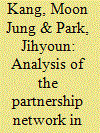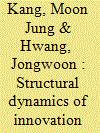| Srl | Item |
| 1 |
ID:
117266


|
|
|
|
|
| Publication |
2013.
|
| Summary/Abstract |
The clean development mechanism (CDM) is a global collaborative action proposed at the Kyoto Protocol in response to climate change issues. The CDM contributes to cost-efficient reduction of greenhouse gas emissions in industrialized countries and promotes sustainable development in developing countries. Its fundamental framework is based on partnerships between industrialized and developing countries. This study employs social network analysis to investigate the dynamics of the partnership networks observed in 3816 CDM projects registered in the database of the United Nations Framework Convention on Climate Change over the period of 2005 to 2011. Our three main findings can be summarized as follows. First, the CDM partnership network is a small world; however, its density tends to decrease as the number of participants for a CDM project decreases. Second, the partnership networks' leading groups tend to shift from partner countries into host countries. Third, a host country that pursues more partnership-based projects takes better control of resources and knowledge-flow in the ego-network formed around that country, and can thus better utilize global resources for its CDM projects.
|
|
|
|
|
|
|
|
|
|
|
|
|
|
|
|
| 2 |
ID:
150015


|
|
|
|
|
| Summary/Abstract |
Innovation in the renewable energy (RE) sector relies on the concept of systemic innovation, which requires interaction between two innovation aspects: technology exploration and market exploitation. The European Union (EU) has introduced political instruments for systemic RE innovation by integrating resources from different thematic and geographic areas. However, using these instruments to establish an ecosystem for systemic innovation remains unexplored. This study develops a framework for evaluating the systemic innovation performance of networks through a time-series analysis of network structural properties. Overall, EU-funded innovation networks have not evolved in a systemic direction. First, the network exhibits densely connected local clusters for technology exploration and market exploitation of RE innovation, which are disconnected from each other. Over time, the gap between the two phases has weakened with increasing connectivity, but the local clusters supporting either explorative or exploitative activities have diminished. The existing networking linkages among organizations are considered ineffective because their positions in the network tend to display a mismatch with their innovation patterns. This research presents policy suggestions for optimizing the exploration and exploitation activities in the EU's funding program and their complementarities to establish a systemic innovation environment in the RE sector.
|
|
|
|
|
|
|
|
|
|
|
|
|
|
|
|